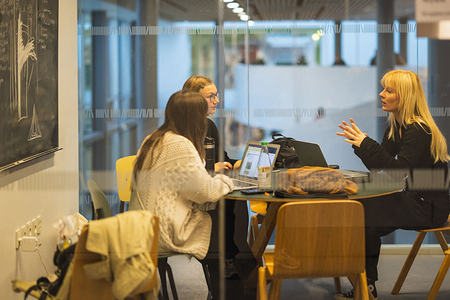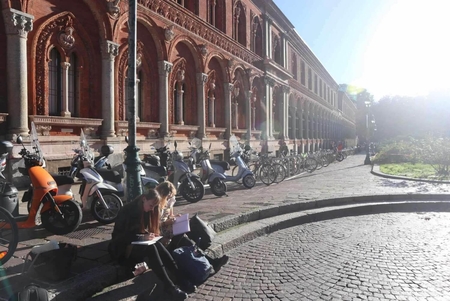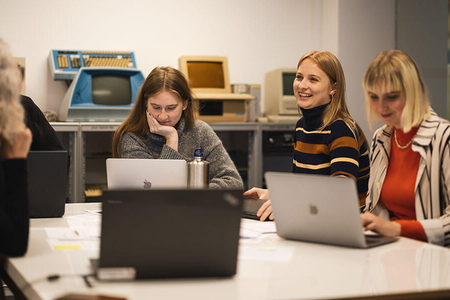About the programme
This international and innovative Master's programme in the Religious Roots of Europe (RRE) gives students a unique opportunity to explore the three major European religions - Christianity, Judaism and Islam - and the impact of these religions on European culture and society. Find information below, and more information at religious-studies.net.
What makes the programme at UCPH unique?
The aim of the RRE programme is to expose students to the traditions, formative processes, and mutual interactions in the ancient world of the three most influential religions at the root of European culture and history: Christianity, Judaism and Islam. In this regard the programme is unique.What specialisations does the field of study offer?
As a graduate of this programme you will be qualified for scholarly work, e.g. in PhD-programmes, as well as for teaching. You will also be able to enter into specialised occupations in government institutions or organisations dealing with culture, integration, diplomacy etc. and in private companies for example with business relations with the Middle East.Considering studying at UCPH this September?
Apply by 15 January if you are an applicant from outside the EU/EEA/Switzerland. Apply by 1 March if you are from the EUAdmission and application
To apply for admission to this master's degree programme, you must have completed a qualifying bachelor’s degree or a similar Danish or international degree programme which is assessed to be relevant. Apply for admission via the application portal.
Below, you can read more about admission requirements and which documents to upload in the application portal.
Academic admission requirements
Here you'll find the different academic requirements depending on which qualifying degree you hold.
A maximum of ten students will be admitted to the programme at the University of Copenhagen each year.
The selection of students is based on the fulfilment of the following admission requirements:
A bachelor's degree in a field of study that is relevant to the programme (e.g., theology, religious studies, classical philology, Semitic languages, ancient history, classical archaeology). The applicant must have, or anticipate getting, a bachelor's degree from a recognized and internationally acknowledged university.
Documented proficiency in one or more "classical" languages (i.e., 15 ECTS in Hebrew, Greek, Latin, or Arabic - e.g. 10 in Latin and 5 in Greek is sufficient, etc.).
The selection of students is furthermore based on the relevance of the bachelor's degree in terms of field of study, as well as on the grades achieved, and on the number of courses and ECTS-points that students have gained in relevant study areas (e.g., theology, religion, ancient history, culture and language).
To apply for admission to a master's programme at University of Copenhagen, you must document that you fulfil the language requirement English B.
Application Procedure for EU/EEA and Swiss Citizens
- Make sure to check the admission requirements.
- Prepare relevant enclosures.
- From 16. January to 1. March you can send your application through the online application portal
- After the application deadline, your application will be evaluated by an academic admissions committee.
- You will receive a response no later than 10 June.
Help with your application
Guide to the online application platform
Checklist for Documentation
In order to make sure we have all the information needed to evaluate your past achievements and future potential, you are required to submit the following items together with the application form:
Documentation of degree
- An original or certified copy* of your academic transcript from your Bachelor degree. If the transcript is in a language other than English or a Scandinavian language, please include an official English translation.
- A certified copy* of your Bachelor diploma. If you are yet to receive your diploma, please provide a letter from your university stating the date when the diploma will be issued.
Documentation of classical language and relevant courses
- Documented proficiency in at least one "classical" language (e.g. 15 ECTS in either Hebrew, Greek, Latin or Arabic; or e.g. 10 ECTS and 5 ECTS in total in two "classical" languages)
- Course descriptions of courses undertaken in your Bachelor degree relevant to the programme you are applying for. These can be in the form of photocopies from your university's academic handbook/course lists or print-outs from the university's website. They should describe what was required of you to complete the courses, what was studied and hours of study. These course descriptions allow us to understand exactly what you have studied in your prior degree, and help us to determine whether you meet the requirements and are eligible for the MA programme.
Statement of Purpose
- A Statement of Purpose (motivational letter). Explaining why you wish to apply for the proposed MA programme.
CV
- An updated version of your CV (curriculum vitae) including a chronological overview of your academic history. A photo is not necessary. Please use this template (doc).
Copy of your passport
- A copy of your passport. Should you have more than one passport (citizenship) please copy the passport which you will use to travel to Denmark.
Application Procedure for Non-EU/EEA Citizens
- Make sure to check the admission requirements.
- Prepare relevant enclosures.
- From 15. November to 15. January you can send your application through the online application portal.
- After the application deadline, your application will be evaluated by an academic admissions committee.
- You will receive a response no later than 10 June.
Help with your application
Guide to the online application platform
Checklist for Documentation
In order to make sure we have all the information needed to evaluate your past achievements and future potential, you are required to submit the following items together with the application form:
Documentation of degree
- An original or certified copy* of your academic transcript from your Bachelor degree. If the transcript is in a language other than English or a Scandinavian language, please include an official English translation.
- A certified copy* of your Bachelor diploma. If you are yet to receive your diploma, please provide a letter from your university stating the date when the diploma will be issued.
Documentation of classical language and relevant courses
- Documented proficiency in at least one "classical" language (e.g. 15 ECTS in either Hebrew, Greek, Latin or Arabic; or e.g. 10 ECTS and 5 ECTS in total in two "classical" languages)
- Course descriptions of courses undertaken in your Bachelor degree relevant to the programme you are applying for. These can be in the form of photocopies from your university's academic handbook/course lists or print-outs from the university's website. They should describe what was required of you to complete the courses, what was studied and hours of study. These course descriptions allow us to understand exactly what you have studied in your prior degree, and help us to determine whether you meet the requirements and are eligible for the MA programme.
Statement of Purpose
- A Statement of Purpose (motivational letter). Explaining why you wish to apply for the proposed MA programme.
CV
- An updated version of your CV (curriculum vitae) including a chronological overview of your academic history. A photo is not necessary. Please use this template (doc).
Copy of your passport
- A copy of your passport. Should you have more than one passport (citizenship) please copy the passport which you will use to travel to Denmark.
Associate Professor Martin Ehrensvärd, PhD, PCC, is the academic coordinator of the programme. You can ask him about most things related to the programme such as:
- Academic requirements
- Study environment
- Programme structure
E-mail: meh@teol.ku.dk
Contact the administration about:
- Admission requirements
- Application
- Study start
E-mail: admissions@ku.dk
Application deadlines
Study start in September
1 March at 23:59
Application deadline for Danish applicants and applicants from within the EU, EEA and Switzerland.
Open for applications from 16 January. You will receive a reply by 10 June.
15 January at 23:59
Application deadline for applicants from outside the EU, EEA and Switzerland.
Open for applications from 15 November. You will receive a reply by 1 May.
| Admission statistics Religious Roots of Europe 2025 | |
|---|---|
| Admitted (of which have start in February) | 17 (0) |
| Admission distribution (legal right/other) | 0% / 100% |
| Applicants | 35 |
| Age average | 29 |
| Nationality (dk/international) | 12% / 88% |
Programme structure
The MA in the Religious Roots of Europe is a two-year programme concluding with the master’s thesis. You can select from and combine a range of courses over the duration of your studies.
In total, the Programme is assigned 120 ECTS credits, consisting of four terms of full-time study, each covering 30 ECTS credits. The Programme consists of modules that vary in the number of ECTS credits allotted. The student must sit their examinations in the modules of every single semester before they can be examined in the modules of the next semester. There is a steady progression culminating in the fourth term with the master’s thesis. It follows that the master’s thesis should be assessed as the final module in the Programme.
Year 1
| First semester | Second semester |
|---|---|
| The Study of Ancient Religion 15 ECTS | Holy Scriptures: Judaism, Christianity and Islam 10 ECTS |
The Emergence of Judaism, Christianity & Islam 15 ECTS | Language 10 ECTS |
Interaction Among the Religions 10 ECTS |
Year 2
| Third semester | Fourth semester |
|---|---|
Interreligious Relations: Defining Moments, Current Encounters 10 ECTS | Master's Thesis 30 ECTS |
Text: Jewish, Christian or Islamic Tradition 10 ECTS | |
10 ECTS |
Programme Curriculum
If you are more interested in the academic content, regulations, and examination requirements, you should consult the curriculum, which serves as the legal foundation for the programme.
There is both a curriculum specific to each degree programme and a general curriculum that applies across the faculty.
Please note that curricula are often revised annually. Any new versions will be published no later than during the spring semester.
Career opportunities
Upon completion of the master’s programme, you will obtain the title Master of Arts in the Religious Roots of Europe.
The importance of expertise in religion and in its role in society and culture is increasingly recognised. As a graduate of this programme you will be qualified for scholarly work, e.g. in PhD-programmes, as well as for teaching. You will also be able to enter into specialised occupations in government institutions or organisations dealing with culture, integration, diplomacy etc. and in private companies with business relations with e.g. the Middle East.
Four Nordic universities have joint their resources on this programme which gives you a wide range of choice in specialised thematic subjects. The programme is offered in English.
For more information about the contents of the programme, see religious-studies.net
The Religious Roots of Europe (RRE) is the first joined Master's programme at The University of Copenhagen and is offered by The Faculty of Theology in cooperation with three other Nordic universities (Aarhus University, Lund University, University of Oslo). Joint Master's programmes are desirable because of their natural international scope and due to the pooling of the competencies of several universities.
The aim of the RRE programme is to expose students to the traditions, formative processes, and mutual interactions in the ancient world of the three most influential religions at the root of European culture and history: Christianity, Judaism and Islam. In this regard the programme is unique.
The three religions have traditionally been studied more or less separately. The RRE programme is about studying the three religions together in their formative period from a comparative perspective, using a variety of approaches, including historical, philological, social scientific, feminist and literary ones.
- International experience.
- Advanced knowledge about the religious traditions at the root of European culture in their formative periods.
- A deep understanding of the formative processes of Judaism, Christianity and Islam, the parallels and differences between the three traditions, and the interaction of their followers.
- The ability to understand, describe and apply relevant scholarly theories and methods.
- Skills to communicate about the subject matter and about theoretical insights, and skills to transmit the acquired methods to others, both orally and in writing.
- The tools to critically evaluate the role of the three religions in contemporary society.
The importance of expertise in religion and in its role in society and culture is increasingly recognised. As a graduate of this programme you will be qualified for scholarly work, e.g. in PhD-programmes, as well as for teaching. You will also be able to enter into specialised occupations in government institutions or organisations dealing with culture, integration, diplomacy etc. and in private companies for example with business relations with the Middle East.
Very many different jobs. So far about 20 % of our alumni have gone on to doing PhD work.
Here are some areas where RRE graduates work:
Public administration, university administration, mission organisation, NGOs, social and integration work, ministry, diplomacy, recruitment agencies, HR partners, private companies.
Research Career
Several RRE-graduates have been or are doing PhD-studies at:
- Lund University
- University of Ghana
- Aarhus University
- University of Heidelberg
- Norwegian School of Theology, Oslo
- Faculty of Theology, Oslo
- University of Helsinki
- Texas A&M University
- University of Notre Dame, Indiana, USA
- Martin Luther Universität, Halle, Wittenberg
- Humboldt Universität, Berlin
- University of Sheffield
- University of Edinburgh
- Yale University
- Oxford University
- International Islamic University of Malaysia
- Saint Petersburg University
- Lvov University
- University of Michigan
- Bergen University
In addition, RRE graduates teach at university level at: University of Florida, Seton Hall in New Jersey, Norwegian University of Science and Theology, Trondheim, and the University of Southern Denmark.
Student life
About half of the students in any given year come from countries outside of Scandinavia. Further, you will be studying at all three universities in the programme (Both Lund and Oslo in addition to Copenhagen), and this produces a truly international atmosphere. Wherever you choose to apply – and are admitted – you will be based for the duration of your studies, and therefore courses taught at the two other universities will partly consist of state of the art e-learning.
However, twice pr. semester, for one or two weeks, you will take part in compact seminars. These seminars include fairly intense face-to-face teaching, combined with a densely packed social itinary. Since its inception in 2009, the students in the programme have enjoyed these seminars immensely, not least because they get to spend IRL time with all of their fellow students. The total number of students in a year is 15-20.
Weekly, or every two weeks, during the first semester you will attend a two-hour tutorial together with the other students based at the University of Copenhagen. The tutorials partly aim at teaching general subjects within the science of religion such as cognition, ritual, mysticism, evolution, and partly their aim is to provide help with writing papers, writing correct English etc.
Finding Housing
Please visit University of Copenhagen general information about finding housing.
Contact student guidance
Questions about study choice and admission
Our student guidance are ready to assist you with answers to your questions about:
- application procedure and the digital application portal
- admission- and language requirements
- documentation
- study life
- career opportunities
- study choice or doubts
Did you not find what you were looking for?
You can find answers to questions most often asked by potential students in the FAQ. Read the FAQ
Questions about the digital application-portal?
Do you have questions about digital application? Check our user guide to the application portal.
In case of technical problems, please contact the IT-support by
- Mail: it-service@adm.ku.dk // Tel: +45 35 32 32 32
Location
- South Campus, Karen Blixens Vej 16, DK-2300 København S.






